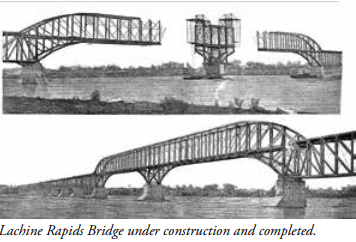River Bridges: (
Historic Bridges;
Satellite)
Seaway Bridges: (
Satellite)
I found a view with a train. It provides scale for the depth of the trusses.
In 2009, the river was rather high considering it is controlled by a dam just on the other side of Montreal.
 |
Article
The main spans were 408' (124m) with a 60' (81.3m) clearance "above ordinary summer water."
"For 29 years, it was the only major continuous bridge in the America's. Many engineers were still reluctant to believe that the savings in iron and steel were high enough to risk the increases in loads and stresses in he truss members due to the unknown possible effects of variations in E, I, the settlement of foundations, and temperature." |
ProposMontréal
posted five images with the comment:
"Nobody remembers the 2nd position" is one of his often shared phrases and in the case of bridges on St. Lawrence, applies to the foot of the letter. People still talk about the
Victoria Bridge by the Grand Tronc Company, like the first one built in 1860. But no one has in mind the Canadian Pacific St. Lawrence Bridge built only 26 years later
This bridge between Kahnawà:ke and LaSalle, is not just the 2nd bridge on the Saint Lawrence, but the 3rd as well. Because it will be completely replaced by the one we cross today, neighbor of the Honoré-Mercier bridge. At the time of its inauguration in 1913, it had the longest continuous rail in the world, 413m
In 1910, rail traffic as well as the mass of larger locomotives made it necessary to reinforce the bridge and add a second lane. CP engineers decide to rebuild the existing bridge by adding a downstream lane to keep the passage open during construction. Extra batteries are planned to reduce the mass and therefore the cost of the new apron
The opening of the Saint-Laurent maritime route in 1959 required the addition of two lifting bridges to replace the fixed crossings. This section has elevator winchs capable of lifting the aprons in 75 seconds to 24 meters above the initial level
1- 1887 Musée McCord
3- 1888 Musée McCord II-88126
4- 1905-1910 Bibliothèque et Archives nationales du Québec / Grande Bibliothèque 2635750
10 Bibliothèque et Archives nationales du Québec / Grande Bibliothèque 2635750
Marc Dufour
shared with the comment: "(Hopefully, the translation function works well for you guys)..."
Dennis DeBruler: The 1887 bridge was a continuous truss. That is very rare for the 19th Century.
 |
| 1 |
 |
| 2 |
 |
3
|
 |
4
[In 1913, they added a second track by building a new bridge next to the old one, and then replacing the old bridge with another new bridge.] |
 |
| 5 |
Because of the St. Laurent rapids, the St. Lawrence Seaway uses a canal on the south side of the river. That is the location of the two lift bridges.












No comments:
Post a Comment